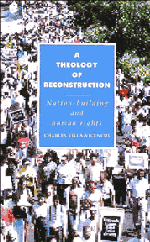Book contents
- Frontmatter
- Contents
- Dedication
- General editor's preface
- Acknowledgements
- Introduction
- 1 Theology and nation-building
- 2 The weight of dead generations
- 3 The rule of law: searching for values
- 4 Human rights and theology
- 5 Transcending individualism and collectivism: a theological contribution
- 6 Theology and political economy
- 7 Theology and economic justice
- 8 The right to believe
- 9 An unconcluding postscript
- Bibliography
- Index
8 - The right to believe
Published online by Cambridge University Press: 13 January 2010
- Frontmatter
- Contents
- Dedication
- General editor's preface
- Acknowledgements
- Introduction
- 1 Theology and nation-building
- 2 The weight of dead generations
- 3 The rule of law: searching for values
- 4 Human rights and theology
- 5 Transcending individualism and collectivism: a theological contribution
- 6 Theology and political economy
- 7 Theology and economic justice
- 8 The right to believe
- 9 An unconcluding postscript
- Bibliography
- Index
Summary
At the centre of the struggle for human rights is the right to the freedom of conscience, freedom of speech and the consequent right to social or political organisation as a basis for defending and promoting one's views. These fundamental rights constitute the heart of the democratic process, on which all other human rights are built, maintained and promoted – whether individual or socio-economic.
The freedom of religion, rather than mere toleration, is an integral and indispensable part of this right and process; not merely at the bourgeois level of each person having the right to hold and promote his or her most essential values whether idiosyncratic or of social value, but more especially as an important ingredient of democratic participation, human solidarity and open debate. This is clearly not to suggest that these social practices are dependent on religion, or that they do not occur without religion. History is cluttered with instances of religious authoritarianism, while many noted democrats and political activists do not choose to regard themselves as ‘religious’. To affirm the importance of the freedom of religion is simply to make two distinct, though related, observations about social engagement.
The first is the sociological claim that (most) people need solidarity groups for the mutual sustaining and care of one another, as a basis for promoting social concerns and, where necessary, as a basis for criticising and opposing the abuse of power. Where this right is protected by law and practice, the democratic process in greatly enhanced.
- Type
- Chapter
- Information
- A Theology of ReconstructionNation-Building and Human Rights, pp. 254 - 273Publisher: Cambridge University PressPrint publication year: 1992



